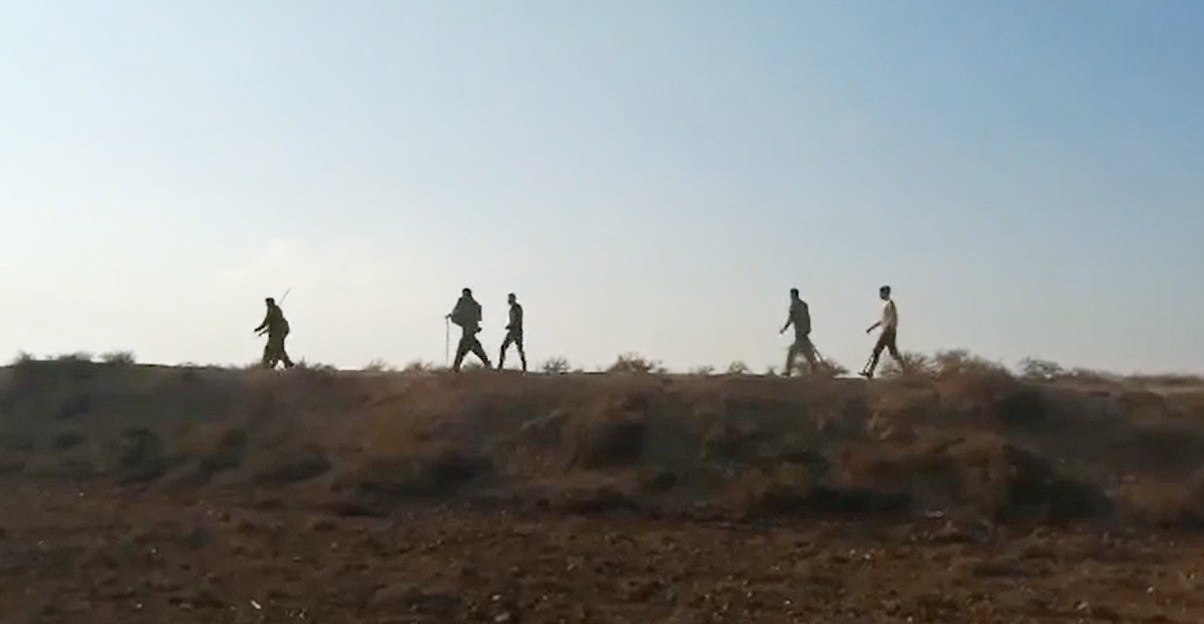While the Arab, Kurdish and Turkmen parties are beginning a new phase of political dispute on Article 140 of the constitution; Arab and Kurdish farmers are fighting over the ownership of agricultural land and are leading the situation to ethnic war.
Tensions in Kirkuk villages and some other disputed territories have been ongoing for years since the political warfare and government measures failed to normalize the situation, most recently the efforts of Mohammed Shia Sudani's cabinet to revive the committee for implementation of Article 140 of the Iraqi constitution, the only constitutional way to resolve the tensions in the disputed territories.
What happened in Haftaghar?
With the beginning of the plowing season, on December 7, 2022, tensions and clashes erupted between a number of Arab and Kurdish farmers in Fariq village in Haftagar area of Daquq district south of Kirkuk while both sides consider themselves victims.
Abdulqadir Hassan, whose head was broken in the fighting, said he was “sunk in blood” when he tried to go to his farmland.
“Obviously the Arab farmers have been preparing to attack us and even used weapons,” he told KirkukNow. He affirms that he has proof that he owns the land dates back to 1972.
But Arab farmers in the same village not only deny using weapons, but also accuse Kurdish farmers of attacking them.
"A group of Kurdish farmers attacked us when we were on our lands. They beat one of our farmers. Another lost one of his eyes earlier and an arrest warrant issued against them," Bara Sabar, an Arab farmer in Haftagar, told KirkukNow.
It is not the first time clashes erupt on agricultural land in the area and have been repeated occasionally in recent years.
"We have orders to use the land, we have old contracts, contracts from 50 years ago, our documents are official and there are no problems.”
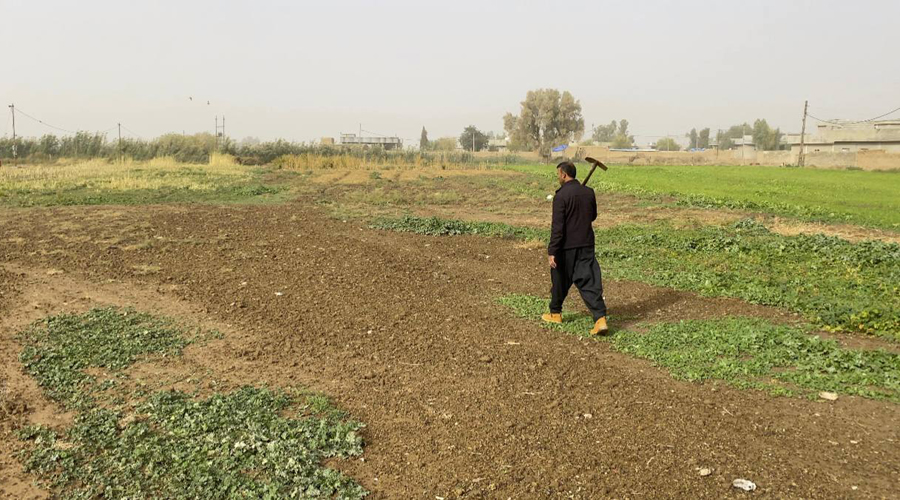
In 1970s, the Baath party led by Saddam Hussein have evacuated the Kurds from Kirkuk into northern provinces, hiring their agricultural lands per contracts to Arab settlers from middle and south of Iraq whom used it up to 2003 when Saddam Hussein regime was toppled.
Then the Arab settlers were compensated to return to their homelands and Kurdish and Turkmen farmers returned to their towns and villages, plowing their farmlands.
“A number of settler farmers started plowing our lands and we prevented them, so tensions broke out and it turned into a fight. They attacked with weapons and we defended ourselves,” Yousef Reza, a farmer in Haftagar, told KirkukNow.
Arab farmers say they have “certified documents” that they own the land, not the Kurds, so they have returned to the area, citing agricultural contracts.
“We have a contract and it is valid. We ask the prime minister to intervene to solve this problem because this is the third time Kurdish farmers have attacked us while we are plowing our land,” Sabah Awad, an Arab farmer in Haftagar, said.
Fatih Sheikh Taha, another Arab farmer, insists that his agricultural land has been occupied by Kurds in Fariq village.
The new tensions in Haftagar have sparked another wave of accusations and media warfare between the Arab, Kurdish and Turkmen parties in Kirkuk.
Arkan Ahmad, a farmer in Haftagar, told KirkukNow that the Arab settlers have seized 4,500 acres of agricultural land in Fariq village alone.
The Iraqi federal government has not yet made any official statement on the Haftagar incident and its consequences.
But Masrour Barzani, Prime Minister of the Kurdistan Regional Government KRG, called on the three Iraqi presidencies to “immediately end the attacks and violations against Kurdish farmers in Daquq and other areas of Kirkuk by those in power and illegal attempts to evict them Kurds and confiscate their lands.”
Few days ago, the Iraqi Justice Minister Khalid Shiwani, a Kurd, visited Kurdish farmers in Daquq, including those involved in the Haftagar tension. However, the Justice Ministry has not issued an official statement on the visit, which has sparked strong Arab protests.
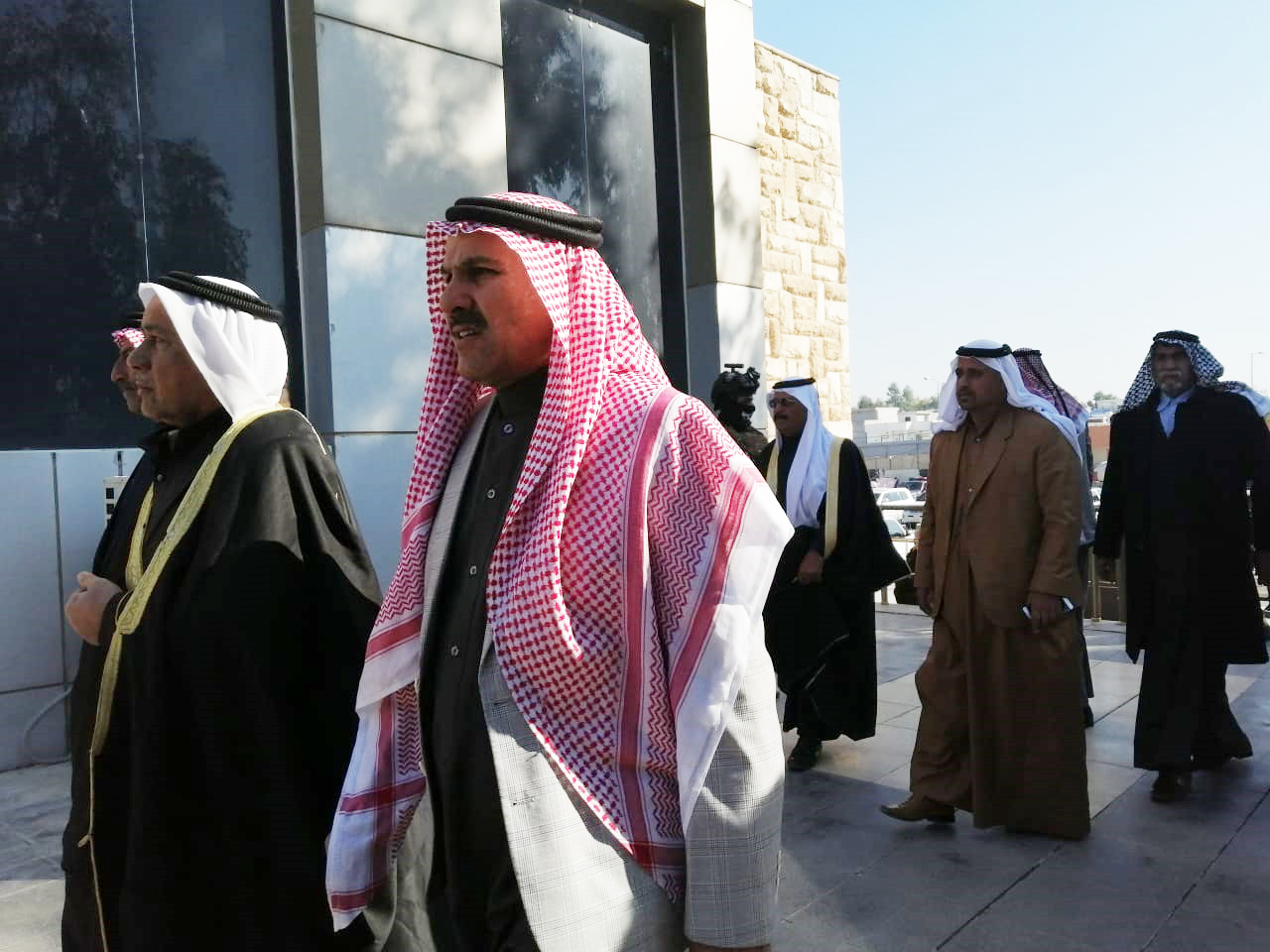
The Arab Council in Kirkuk, chaired by current acting governor of Kirkuk Rakan Saeed al-Jiburi, said in a statement and press conference, on December 10, 2022, the Justice Minister's visit was interpreted as an attempt to "create chaos and intrigue between Arabs and Kurds” and believe there is an attempt to evict the Aram farmers from their farms.
In response, Dylan Ghafoor, a Kurdish member of the Iraqi parliament accompanied the Justice Minister during his visit to Daquq, responded to the Arab Council saying, "Coexistence and social peace between communities is our goal and we have always worked in that direction. There is evidence that farmlands were confiscated from Kurdish farmers and given to Arab settlers under the previous regime.”
The case of agricultural lands
Agricultural land is one of the most complicated issues in Kirkuk province and other disputed areas, pending for 19 years.
After the fall of the Ba'ath regime in 2003, most displaced Kurdish families were returned to their home areas and Arab settlers were repatriated to their former areas, after both sides were compensated with money and land.
Two years later, according to the Iraqi permanent constitution, specifically in Article 140, the settlement of agricultural land ownership was included as part of the initial stages of this article, in the name of normalization, but resulted in few practical steps.
The issue of agricultural land remained pending until after the events of October 16, 2017, when the Iraqi security forces ISF of the federal government returned to Kirkuk and all the disputed areas, forcing the Kurdish forces to rrtreat to KRG-controlled territories.
From the beginning of the 2014 attacks of the Islamic State of Iraq and the Levant (ISIL) until October 2017 and the consequences of the referendum for independence, the KRG had full control over Kirkuk province and most other disputed areas, especially in terms of security.
Over the past five years, agricultural land has been intensely contested in Kirkuk, Khanaqin, and sometimes in Duzkhurmatu and the Nineveh Plain.
Before the Haftagar incident in July, Kurdish farmers in five villages in Kirkuk's Dubiz district protested against the Iraqi army, which they said prevented them from plowing 25,000 hectares of agricultural land in the villages of Palkana, Gabalak, Kharabrut, Sarbashakh and Shanagha.
Palkana and several surrounding villages have been the subject of tensions and disputes between local residents and officials over the ownership of the area and its agricultural land. Residents of about 35 villages in Sargaran subdistrict in western Kirkuk have been living in unrest for several years.
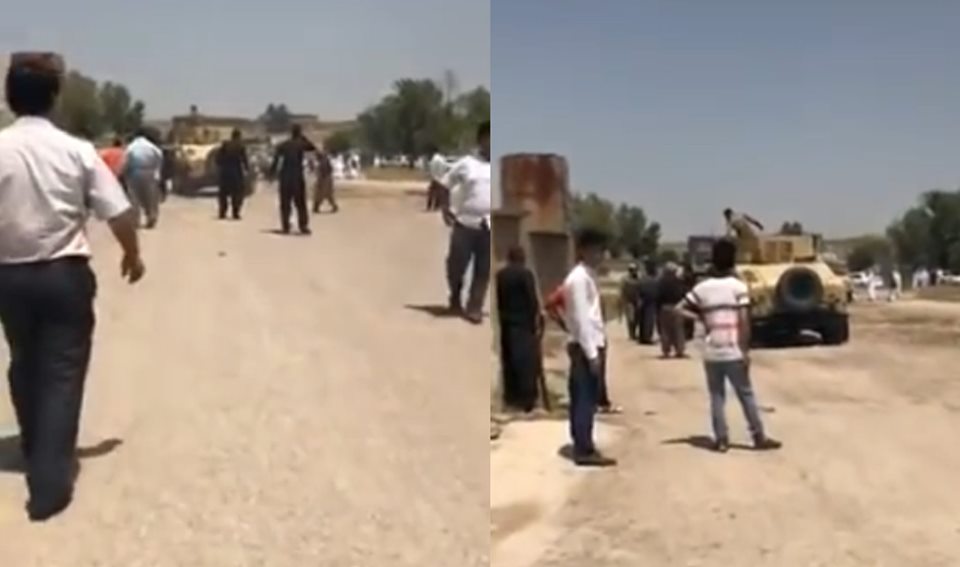
Kirkuk, May 14, 2019: Clashes between Kurds and Arabs in Palkana village of Kirkuk.
In Khanaqin district of Diyala province, Kurdish farmers held a protest last March against the demand of Arab settlers to take back the agricultural land in the region, which coincided with the demand of a number of Arab farmers to renew their contracts with the local administration.
According to statistics from the agricultural land department of Khanaqin agriculture department, more than 2,000 agricultural land contracts were signed for Arab citizens between 1976 and 2003.
In late 2021, due to the recurrence of tensions over agricultural land, a committee of the Iraqi parliament began to investigate the issue and was supposed to resolve the issue through a series of recommendations to the federal government, but to no avail.
These agricultural lands have been given to Arab farmers on contract basis by the decision of the Revolutionary Leadership Council of Baath party led by Saddam Hussein.
According to the agenda of the Iraqi government led by Mohammed Shia Sudani, in an item to draft and endorse a new law, refers to the cancellation of decisions of the Revolutionary Leadership Council, some of which relate to the disputed areas.
In November 2022, 14 Kurdish parties in Kirkuk sent a letter to Iraqi President Latif Rashid demanding an end to the army's interference in the local affairs of the province and a legal solution to the agricultural land issue.
In addition to tension and complications; Several other cases of agricultural land are pending in the courts due to complaints from Kurdish and Arab farmers.
In the latest judicial process, on November 29, the Daquq court verdict over 1,113 hectares of land was in favor of the Kurdish farmers.
Shikar Mardan, a lawyer for Kurdish farmers, told KirkukNow that the court's decision is in the interest of Kurdish farmers, as it suspended the complaint of Arab farmers who wanted to continue using the agricultural land they got per contract during the Ba'ath regime.
The Iraqi Ministry of Justice on September 23, 2020 issued a decree to seven Iraqi provinces, including Kirkuk, emphasizing the suspension of work with Agricultural contracts during the Ba'ath Party rule, but the Kirkuk Agriculture Department refused to comply with them.
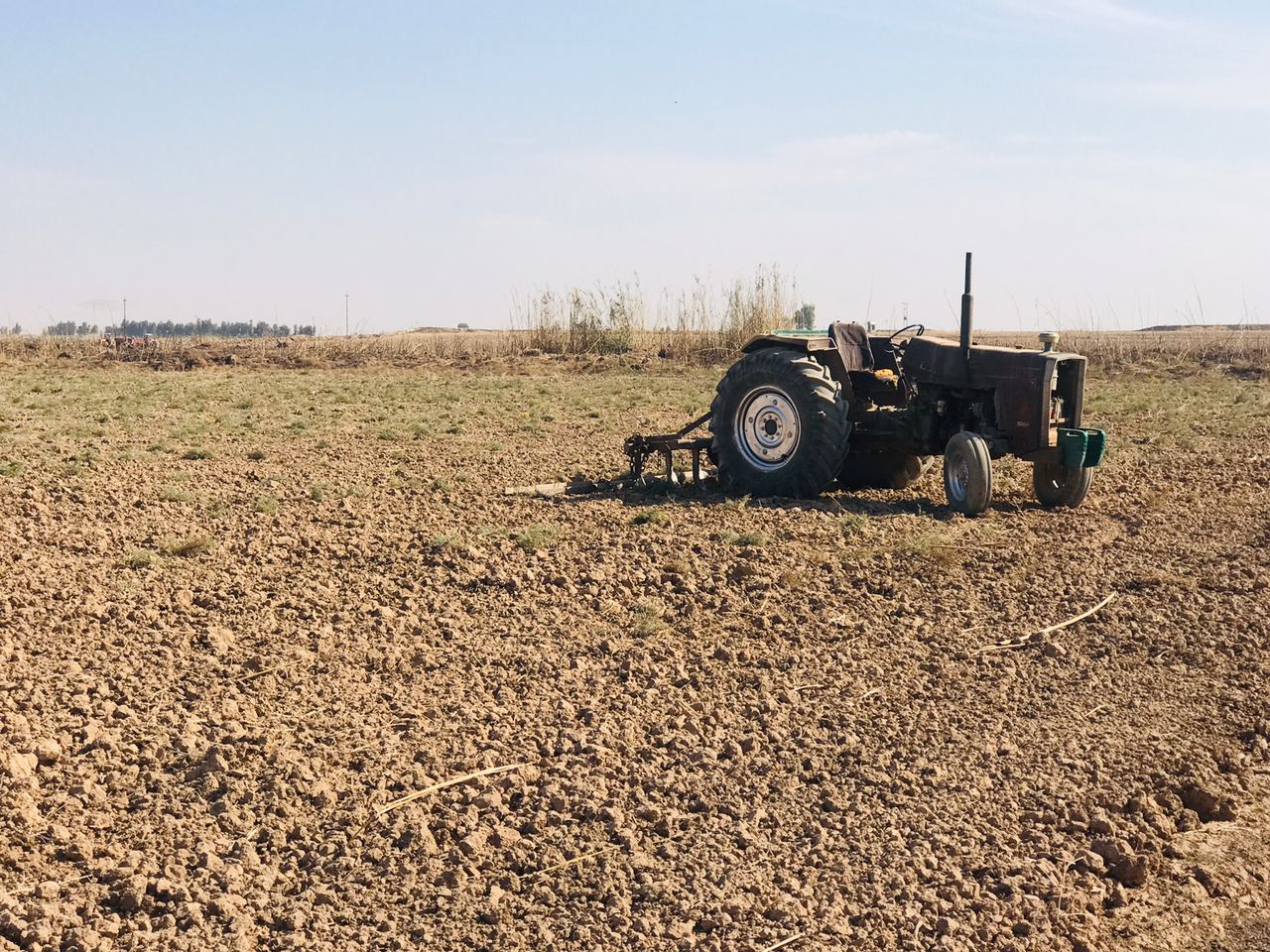
Judge Qasim Mohammed, president of the Kirkuk Court of Appeal in 2021, said in an interview with the Judicial Council website that the issue of agricultural land will be resolved by law and by the courts.
“Most of the original inhabitants of those areas whom have documents and forced to leave in 2003, have been able to regain their agricultural contracts after filing a complaint in court.”
According to the president of the Court of Appeal, the agricultural contracts have been suspended under Article 140 of the constitution, but the owners of the suspended contracts will file a complaint in the courts to lift the suspension.
“Provided that he is original inhabitant, the farmer has the right to lift suspension over land in case has not received financial compensation.”
Implementation of Article 140 of the Constitution
According to the Iraqi constitution, which was approved by a majority of Iraqi voters in early 2005, the fate of the disputed territories must be decided after three stages of normalization, census and referendum, according to Article 140, which is due by end of 2007.
The constitutional article is based on the implementation of Article 58 of the Iraqi State Administration Law for the Transitional Period, which was issued in March 2004 and consists of three main articles.
The disputed territories is a constitutional term used to refer to the political and administrative situation in Kirkuk province and the areas that have been changed in terms of administrative and demographic conditions due to the policies of the Iraqi government from 1968 up to 2003.
Khalid Shiwani, the Iraqi Justice Minister on behalf of the Patriotic Union of Kurdistan PUK, said in a statement on November 28, 2022, "The prime minister decided to re-establish the High Committee for the Implementation of Article 140, which was disrupted in and submit it to the Council of Ministers for inclusion in the general budget.”
According to the agenda of PM Sudani's cabinet, the High Committee for the Implementation of Article 140 will be formed with the allocation of budget and payment of financial entitlements of those who benefit from this article, within a month after the formation of the government.
The previous Iraqi government, led by Mustafa Al-Kadhimi, did not work on Article 140 of the constitution when it received parliamentary confidence in May 2020.
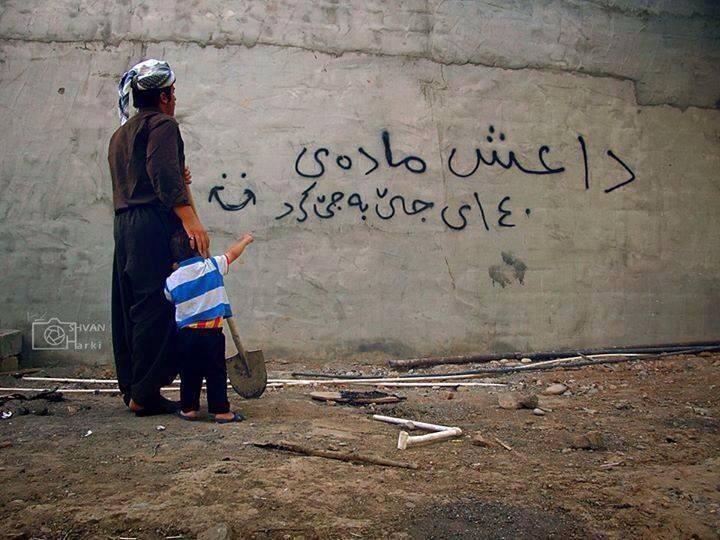
The Arab Council in Kirkuk, on December 10, 2022 in a press conference announced their opposition to Article 140, saying it is "expired" and previously warned that the issue is "used to cause chaos" by some parties.
On December 3rd, the same council issued a statement protesting against the new government, saying that if Article 140 is implemented, it will lead Kirkuk to an "uncertain" situation.
"Article 140 is a wrong and failed step for the situation in Kirkuk, unrealistic and an imposed article," said Rakan al-Jiburi, acting governor of Kirkuk, in an interview with the semi-official Iraqia television channel in November.
The United Arab Front in Kirkuk, on December 4, issued a statement opposing Article 140, saying it was "constitutionally expired."
However, the Federal Supreme Court in 2019 insisted on the validity of Article 140 of the constitution until all the procedures related to that article are implemented.
The Arab and Turkmen parties of Kirkuk believe that the issue of Kirkuk is the key to the unity of Iraq, so it cannot be resolved by the procedures provided for in Article 140, but the solution is consensus among the communities in the province. In addition to Kirkuk, more than 10 administrative units in Nineveh, Diyala and Salahaddin will be determined according to this article.
Hassan Turan, leader of the Iraqi Turkmen Front ITF, one of the leading Turkmen parties, has warned against "reworking Article 140 as included in the government's agenda" as the Turkmen views have not been taken into account and the article has "failed" to find a peaceful solution to the cause of Kirkuk.
Meanwhile, the Turkmen parties and parliamentarians of this community, on December 3, 2022, in a statement stressed that their position on Article 140 is clear.
"This article has failed to resolve the Kirkuk issue and resolve the issue of agricultural land ownership.
A constitutional committee to implement Article 140 was established in 2006 to repatriate and compensate families who were displaced during the previous regime (1968-2003) or who were displaced and settlers replaced them.
The committee, whose members and chairman were from Iraqi communities, opened special offices in several provinces. In recent years, the budget was suspended and in 2021, less than 13 billion Iraqi dinars IQD (ISD100 millions) were allocated for the work of this article, while it needed more than 60 billion IQD.
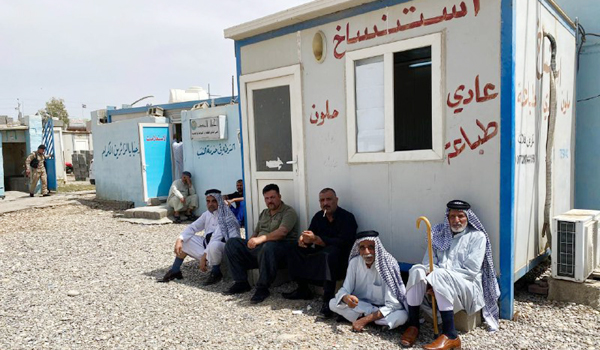
Diyala, May 2022: A number of Arab settlers in front of a police station in Khanaqin, waiting to file a complaint to regain their farmlands. KirkukNow
Dizhwar Fayeq, the head of the Article 140 Board of the (KRG), told the media of Kurdistan Democratic Party KDP, that the high committee for the implementation of the article will be reorganized within a month and start paying the financial entitlements.
"Article 140 is constitutional and everyone should try to implement its provisions," Fahmi Burhan, chairman of the General Board for territories beyond control of KRG, told a news conference in Kirkuk on December 7.
Compensation for the internally displaced Persons IDPs is part of the first phase of implementation of Article 140; This will be done through the return of those who were displaced from Kirkuk and other disputed territories outside the province, as well as compensation for those families who were imported to the province.
Those who were displaced will be paid 10 million IQD each, while the settlers are entitled to get 20 million IQD once they return to their homelands.
Mariwan Qarani, deputy KDP faction in the Iraqi parliament, said in a statement on November 29, "Finally, the efforts of our party and the wishes of the ninth cabinet have been achieved.”
The PUK faction in the Iraqi parliament, said in a statement that 50 lawmakers signed a petition calling for the formation of a committee to monitor implementation of Article 140 by the new cabinet.
In Kirkuk province alone, over 54,000 families have received compensation checks, both displaced and settler families during the past 10 years, according to the statistics of the Article 140 Implementation Committee for KirkukNow, while thousands of families still await compensation.
The KRG at a meeting on December 7, 2022, welcomed the decision of the federal government to re-establish the committee to implement Article 140, according to a statement by the KRG.
Outside the procedures of Article 14 of the Constitution; In 2020, a group of activists, personalities and lawyers announced a project for the regionalization of Kirkuk province, yet the proposal was not supported by any political party from their different communities.
The move was in accordance with Article 119 of the Iraqi constitution, which gives one or more provinces the right to form a region based on a request for a referendum.

